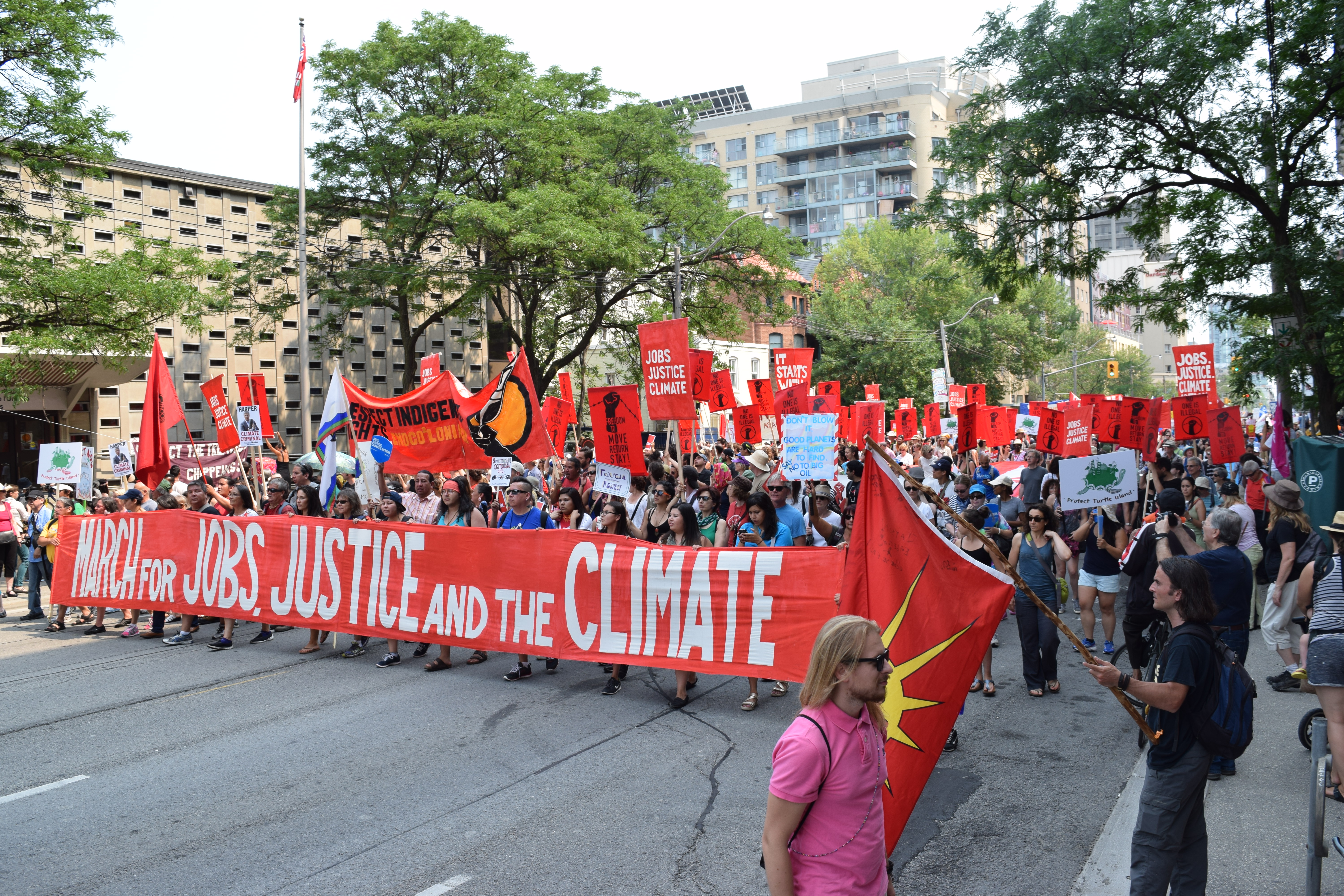Chip in to keep stories like these coming.
Under the bright and unrelenting heat of the Sunday afternoon sun, thousands of protesters gathered at Queen’s Park in Toronto yesterday to demand just solutions to climate change.
Estimated attendance at the March for Jobs, Justice, and the Climate was over 10,000 people and the crowds were made up of a diverse mix of participants including seasoned poverty and migrant justice activists, newly politicized families and environmentalists, and even a vegan contingent.
Among the throngs of signs were also thousands of union flags and banners, representing a diversity of unions and union members.
“It’s very simple: there are no good jobs on a dead planet. And we’ve understood that slogan for a long time,” said President of the Toronto and York Region Labour Council John Cartwright.
Because well-paid jobs are often found in the building trades and resource extraction industries, one might think that the labour movement might find itself at odds with environmentalists calling for divestment from the petroleum industry and less urban sprawl. But according to Cartwright, going green is not as foreign a concept to labour as some might think.
“I come out of the construction trades, and in the 1990s when we had record unemployment, we were able to put thousands of people back to work doing energy retrofits in buildings, looking at alternative energy, we were involved in trying to get transit moving again — all of those things that are part of a green economy can give people back jobs,” he said, adding that the Canadian Labour Congress was actually the first national labour body in the world to have a green jobs strategy endorsed at a national convention, in 1999.
“And on the other hand, where Stephen Harper has taken this country is embarrassing, not only on the world stage but it also means that we’ve completely unbalanced our economy. The petro-dollars have cost us tens of thousands of manufacturing jobs in Ontario. It’s time that Canada once again played a role in shaping a future where all of us can live together,” said Cartwright.
United Steelworkers Toronto Area Council President Carolyn Egan was marching with hundreds of other Steelworkers at Sunday’s march. She agrees that Canada’s labour movement has been on a green trajectory since at least the 1990’s.
“We fought for a long time so that the environment and jobs are not at odds,” said Egan. “It’s very important for working-class people in all our diversity to be here as part and parcel of the climate justice movement.”
“There are a lot changes that we’d like to see,” Egan added. “Our Area Council is against Line 9, for example, but we feel there should be a real industrial strategy in this country to create good green jobs across the country and that will help solve the economic crises and the climate crises.”
Among labour groups represented at the March were Unifor, the United Steelworkers, several teachers unions, the Canadian Union of Public Employees, and several other unions and worker organizations, like the Toronto-based Workers’ Action Centre.
“We’ve got a very diverse workforce; from the Caribbean and South Asia, and their countries of origin have been greatly affected by climate change. I think people appreciate, even looking at North America, whether it was the hurricane in New York City, or Katrina in New Orleans. They see what happens and they know there has to be change and they want to be a part of it,” said Egan. “I think today people get it very much. There has been huge job loss, and the fact that we are fighting here for jobs, justice, and climate actions, those are things that make a huge difference to the lives of workers.”
The march, which travelled through Toronto’s downtown core from Queen’s Park to Allen Gardens, took place in anticipation of the Climate Summit of the Americans, which will begin in Toronto on Tuesday.
Ella Bedard is rabble.ca’s labour intern and an associate editor at GUTS Canadian Feminist Magazine. She has written about labour issues for Dominion.ca and the Halifax Media Co-op and is the co-producer of the radio documentary The Amelie: Canadian Refugee Policy and the Story of the 1987 Boat People.
Chip in to keep stories like these coming.



